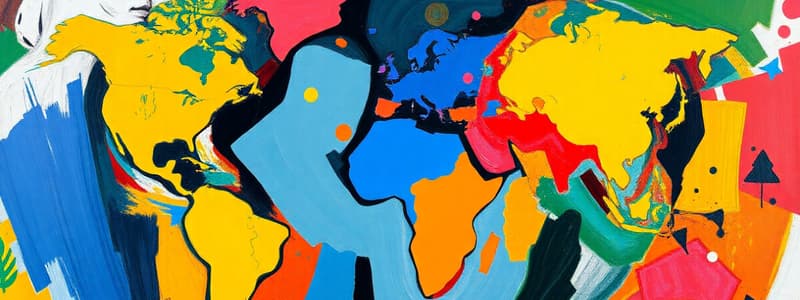Podcast
Questions and Answers
The United Nations aims to eliminate extreme poverty for all people by the year 2030.
The United Nations aims to eliminate extreme poverty for all people by the year 2030.
True (A)
Absolute poverty is defined as living on less than $2 a day.
Absolute poverty is defined as living on less than $2 a day.
False (B)
Economic globalization is characterized by a decrease in cross-border trade and international capital flow.
Economic globalization is characterized by a decrease in cross-border trade and international capital flow.
False (B)
In the Philippines, a person is considered to be living in poverty if they make less than 100,534 pesos a year.
In the Philippines, a person is considered to be living in poverty if they make less than 100,534 pesos a year.
Climate change has been identified as a positive factor in improving global poverty.
Climate change has been identified as a positive factor in improving global poverty.
Tariffs are fees applied to both imports and exports.
Tariffs are fees applied to both imports and exports.
The concept of fair trade prioritizes the well-being of large corporate producers.
The concept of fair trade prioritizes the well-being of large corporate producers.
Mobile phones are considered the least transformative technology for developing countries.
Mobile phones are considered the least transformative technology for developing countries.
Protectionism became less prevalent following World War II.
Protectionism became less prevalent following World War II.
In 2006, spending on certified fair trade products decreased compared to the previous year.
In 2006, spending on certified fair trade products decreased compared to the previous year.
Flashcards are hidden until you start studying
Study Notes
United Nations Millennium Development Goals
- The UN created eight Millennium Development Goals in the 1990s to tackle global issues.
- First goal: Eradication of extreme poverty and hunger.
- Other goals include universal primary education, gender equality, child mortality reduction, maternal health improvement, disease combat (e.g., HIV/AIDS, malaria), environmental sustainability, and global development partnerships.
- Target to achieve these goals was set for 2015.
Poverty Definitions and Statistics
- In the Philippines, official poverty line is defined as earning less than 100,534 pesos annually or around 275 pesos daily.
- Extreme poverty is characterized by severe deprivation of basic human needs; defined as living on less than $1.25 per day.
- UN aims to eliminate extreme poverty globally by 2030, reporting 836 million people lived in extreme poverty in 2015, down from 1.9 billion.
- World Bank predicts extreme poverty could drop to less than 400 million by 2030, but climate change poses a significant threat.
Income Inequality and Globalization
- Income inequality persists, with one in seven people lacking electricity.
- Economic globalization is a major contributor to global poverty dynamics.
- Defined as the increasing interdependence of world economies through trade, capital flow, and technology spread.
Economic Globalization Types
- Protectionism involves government intervention to support domestic production while limiting foreign competition. Common forms: quotas and tariffs.
- Example: A pen costing $1.00 becomes $6 in Country B due to a $5 tariff.
- Protectionism peaked during the Great Depression of 1929, still practiced by countries like China, Japan, and the US.
Shift from Protectionism to Trade Liberalization
- Post-World War II marked a shift towards trade liberalization and free trade.
- Free trade agreements facilitate the easier movement of goods and services globally.
- Mobile phones are highlighted as a transformative technology in developing countries, allowing for leapfrogging to advanced technologies.
Fair Trade and Its Impact
- Fair trade focuses on social, economic, and environmental welfare of marginalized producers.
- Objectives: ensure fair prices, promote safe working environments, and establish sustainable practices.
- Examples of fair trade products: coffee, bananas, cotton, wine, tea, chocolate.
- In 2006, $2.2 billion was spent on fair trade certified products, a 42% increase from the previous year.
- Coffee growers in Brazil received at least $1.29 per pound due to fair trade initiatives, compared to the market price of $1.25.
Studying That Suits You
Use AI to generate personalized quizzes and flashcards to suit your learning preferences.




